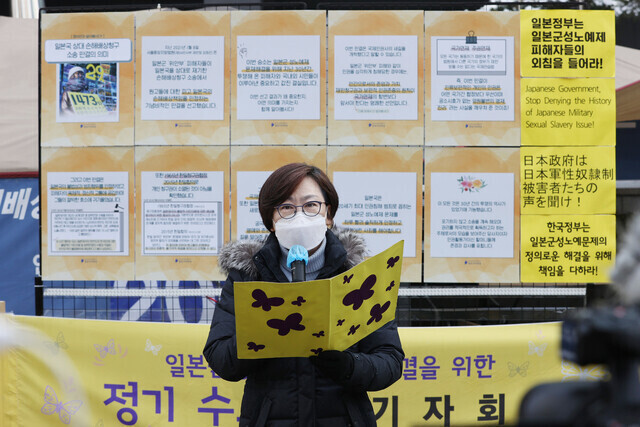hankyoreh
Links to other country sites 다른 나라 사이트 링크
More than 1,100 feminists worldwide say Ramseyer’s paper can be “used to justify” sexual slavery

Feminist scholars across the world have released a statement of solidarity condemning an academic paper by Harvard Law School professor J. Mark Ramseyer that portrays the comfort women as prostitutes working on voluntary contracts.
The Korean Council for Justice and Remembrance for the Issues of Military Sexual Slavery by Japan announced the open letter concerning Ramseyer’s paper during its 1,479th Wednesday demonstration, which took place on the morning of Feb. 17.
The Korean Council said that Ramseyer’s article “disregarded the courageous testimony of the victims in the Asia-Pacific, the fruits of decades of fact-finding and research by scholars, and recommendations and reports by international groups such as the UN and the ILO while expressing the distorted viewpoint of the Japanese government.”
“In solidarity with the campaign to resolve the issue of the Japanese military’s system of sexual slavery, Black Lives Matter, the #MeToo movement, and anti-colonialism, feminist researchers from South Korea and other countries drafted and circulated an open letter criticizing the use of historical distortion to perpetuate sexist and colonial structures,” the Korean Council explained.
As of 3 pm on Feb. 17, more than 1,100 researchers and organizations from countries including South Korea, the US, the Philippines, the UK, Australia, New Zealand, Germany and Canada had signed the open letter.
The signatories include longstanding scholars of the comfort women issue such as Peipei Qiu, a professor at Vassar College in New York; Elizabeth Son, a professor at Northwestern University; Linda Hasunuma, a professor at Temple University; and Margaret Stetz, a professor at the University of Delaware.
“This letter is not meant to infringe upon the rights to academic freedom but to address the implications of academic knowledge that upholds sexist, patriarchal, and colonialist perspectives at the expense of uncovering the deeply entrenched, interlocking systems of oppression,” the letter says.
“We are concerned that such a line of argument can be used to justify violence against women and the perpetuation of systems of sexual slavery and exploitation.”
The letter asserts that Ramseyer’s scholarship perpetuates more violence against the comfort women survivors and the survivors of sexual violence in the current era and reinforces the Japanese government’s deliberate distortions and denial of history.
“Deconstructing sexual slavery and exploitation of women’s bodies in both the past and present is instrumental in building institutions and societies that respect women’s rights and survivors’ fight for justice.”
The signatories also called upon universities and other higher learning institutions to take institutional measures to prevent similar issues from occurring under the guise of academic freedom.
By Lee Jae-ho, staff writer
Please direct questions or comments to [english@hani.co.kr]

Editorial・opinion
![[Column] Has Korea, too, crossed the Rubicon on China? [Column] Has Korea, too, crossed the Rubicon on China?](https://flexible.img.hani.co.kr/flexible/normal/500/300/imgdb/original/2024/0419/9317135153409185.jpg) [Column] Has Korea, too, crossed the Rubicon on China?
[Column] Has Korea, too, crossed the Rubicon on China?![[Correspondent’s column] In Japan’s alliance with US, echoes of its past alliances with UK [Correspondent’s column] In Japan’s alliance with US, echoes of its past alliances with UK](https://flexible.img.hani.co.kr/flexible/normal/500/300/imgdb/original/2024/0419/2317135166563519.jpg) [Correspondent’s column] In Japan’s alliance with US, echoes of its past alliances with UK
[Correspondent’s column] In Japan’s alliance with US, echoes of its past alliances with UK- [Editorial] Does Yoon think the Korean public is wrong?
- [Editorial] As it bolsters its alliance with US, Japan must be accountable for past
- [Guest essay] Amending the Constitution is Yoon’s key to leaving office in public’s good graces
- [Editorial] 10 years on, lessons of Sewol tragedy must never be forgotten
- [Column] A death blow to Korea’s prosecutor politics
- [Correspondent’s column] The US and the end of Japanese pacifism
- [Guest essay] How Korea turned its trainee doctors into monsters
- [Guest essay] As someone who helped forge Seoul-Moscow ties, their status today troubles me
Most viewed articles
- 1[Column] The clock is ticking for Korea’s first lady
- 2Hong Se-hwa, voice for tolerance whose memoir of exile touched a chord, dies at 76
- 3After 2 months of delayed, denied medical care, Koreans worry worst may be yet to come
- 4[Column] Has Korea, too, crossed the Rubicon on China?
- 5US overtakes China as Korea’s top export market, prompting trade sanction jitters
- 6Samsung barricades office as unionized workers strike for better conditions
- 7[Correspondent’s column] In Japan’s alliance with US, echoes of its past alliances with UK
- 8All eyes on Xiaomi after it pulls off EV that Apple couldn’t
- 9[Correspondent’s column] The US and the end of Japanese pacifism
- 10[Guest essay] How Korea turned its trainee doctors into monsters